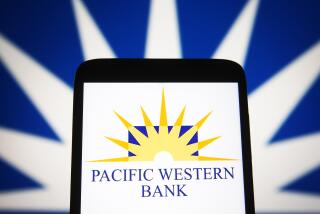Qwest Offers to Buy US West, Frontier for $55 Billion
- Share via
Qwest Communications International Inc. on Sunday made surprise offers to buy Baby Bell US West Inc. and long-distance provider Frontier Corp. for a combined $55 billion, moving boldly to woo the two companies away from their merger partner, upstart Global Crossing Ltd.
Denver-based Qwest, bent on bulking up to compete with ever-growing rivals such as AT&T;, sent offer letters to the chairmen of both companies detailing the separate acquisition bids. In its letters, Qwest declared its offers “financially superior” to the deals each company struck with Global Crossing.
Qwest offered US West shareholders up to $80 per share in Qwest common stock--making the deal worth $40.2 billion to $41.3 billion, depending on conditions.
The company’s offer for Frontier, a nationwide long-distance carrier based in New York state, includes $20 per share in cash and up to $55 per share in Qwest stock--assets worth up to $13.6 billion, depending on conditions. Qwest said it would assume $11.4 billion in debt through the two mergers.
Bermuda-based Global Crossing, a new company that is building an undersea telecommunications network and has executive offices in Los Angeles, last month agreed to buy US West in a complicated $37-billion stock deal. In March, it announced plans to buy Frontier for more than $11 billion.
The two deals catapulted little-known Global Crossing into the telecom limelight, and losing the companies to Qwest would be a blow to its long-term strategy of becoming a major player in the United States and abroad.
It’s unclear whether a bidding war will break out over Frontier and US West, two of the largest U.S. telecommunications companies that are still independent after a rapid-fire round of mergers.
“This would instantly allow Qwest or Global Crossing to compete against AT&T; and MCI WorldCom on the national stage, so neither one would want to walk away,” said Jeffrey Kagan, an Atlanta-based telecommunications consultant. “I’d expect both companies have the resources to up the ante a few more times before the fat lady sings.”
Global Crossing executives declined to comment Sunday on the challenge from Qwest. Representatives of Frontier and US West acknowledged the offers from Qwest but said only that their boards would review the proposals.
Underscoring the urgency among telecom companies to consolidate in order to compete globally, Qwest itself became the subject of speculation last week as BellSouth said it was considering increasing its stake in the company. The southeastern Baby Bell, which remains independent, recently purchased a 10% interest in Qwest, but many analysts believe BellSouth will wait to act.
In the meantime, Kagan and others have suggested for weeks that Qwest might make a run for US West, especially because Wall Street has reacted unfavorably to the Global Crossing-US West marriage. Global Crossing’s highflying stock is down almost 16% since that deal was announced.
Afshin Mohebbi, Qwest’s president and chief operating officer, said the company has strong relationships with both Frontier and US West and has spent the last three weeks poring over public documents to weigh the pros and cons of the three-way combination.
“We really took our time . . . and the more we looked at it, the more we thought it was something we had to do,” Mohebbi said. “I think the synergies are real.”
Certainly, fast-moving Qwest has shown itself to be an aggressive player, making heavy investments in building its own fiber-based telecommunications network, then reaching out to buy other firms, including long-distance company LCI International in a $4.4-billion pact that closed last month. If Qwest succeeds in winning Frontier and US West, they would be its sixth and seventh acquisitions.
If Qwest acquires the two phone companies, the combination would form a telecom powerhouse with $87 billion in market capitalization, $22 billion in revenue, 31 million customers and 71,000 employees.
The three companies would have about 32% of the total number of U.S. access lines, Mohebbi said. “This would give us the might to go after the rest of the 68%.”
Qwest said it would refrain from offering long-distance phone service in US West’s 14-state territory until the Baby Bell wins regulatory approval to offer it within its service area.
Now, the focus is on the boards at Frontier and US West, which must weigh the relative merits of the competing offers.
If the two companies go with Qwest, Global Crossing would be entitled to certain “breakup” compensation. The payments are believed to be $270 million if the Frontier deal sours and $850 million if US West backs out.
The offers from Qwest are separate and failure to close one will not wipe out the other, the company said. However, certain events may affect the value of the respective transactions.
Qwest said it offered 1.738 shares of its stock for each US West share. But if Frontier also agrees to merge, that exchange rate rises to 1.783 Qwest shares.
The offer for Frontier includes $20 in cash and 1.181 shares of Qwest stock for each Frontier share. The rate would rise to 1.226 if US West also agrees to merge.
Asked if Qwest would pursue a bidding war if need be, Mohebbi said, “We’re very confident that we’re going to win.”






